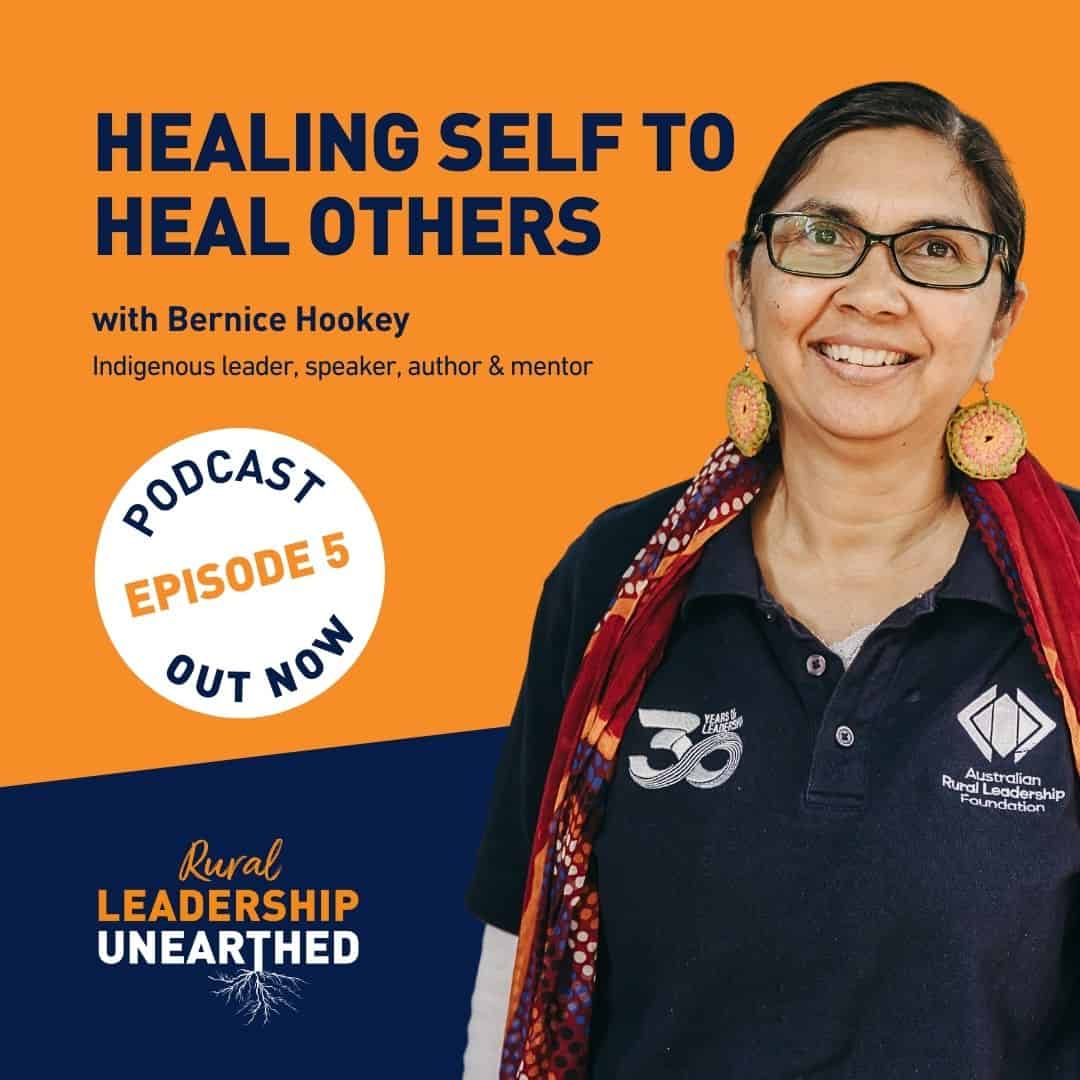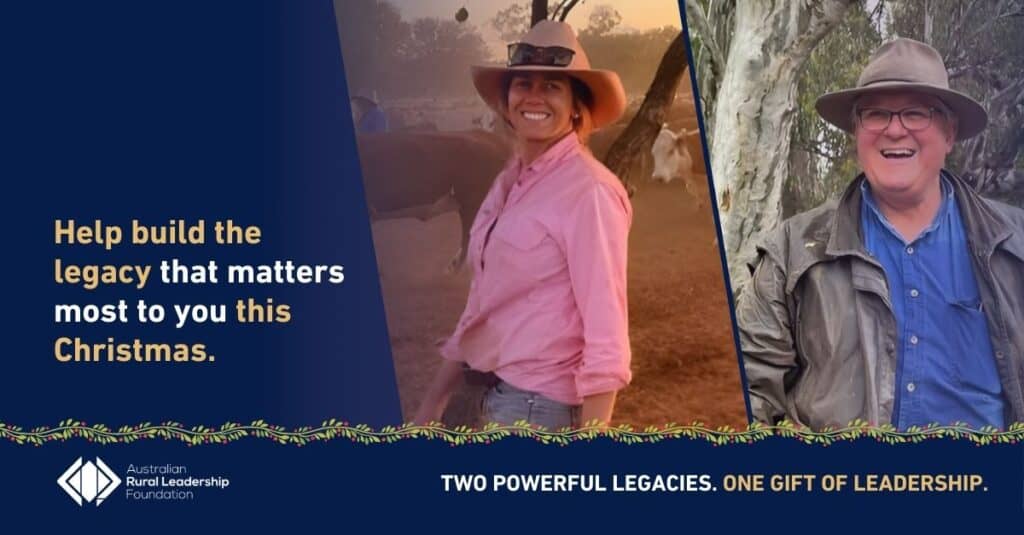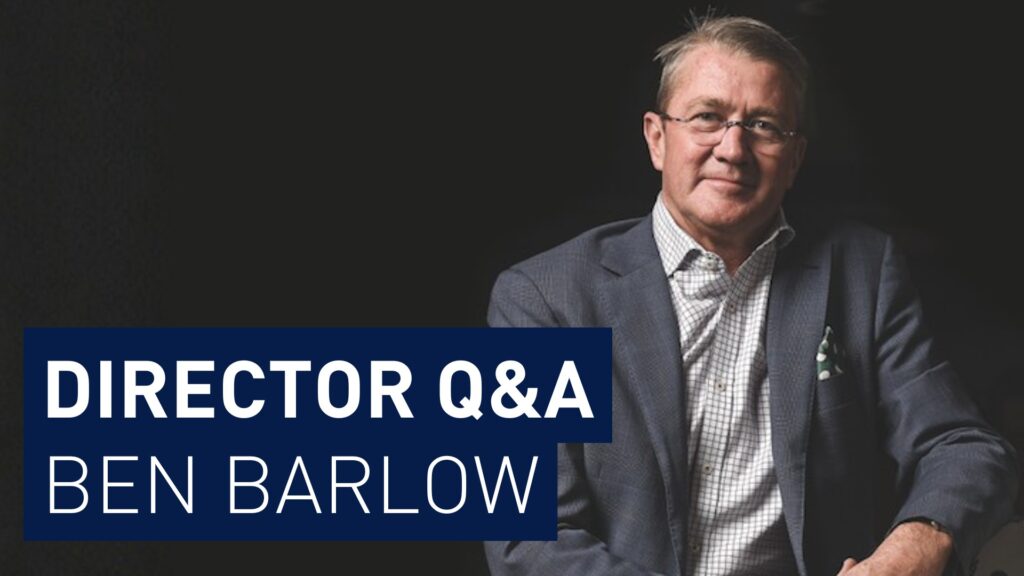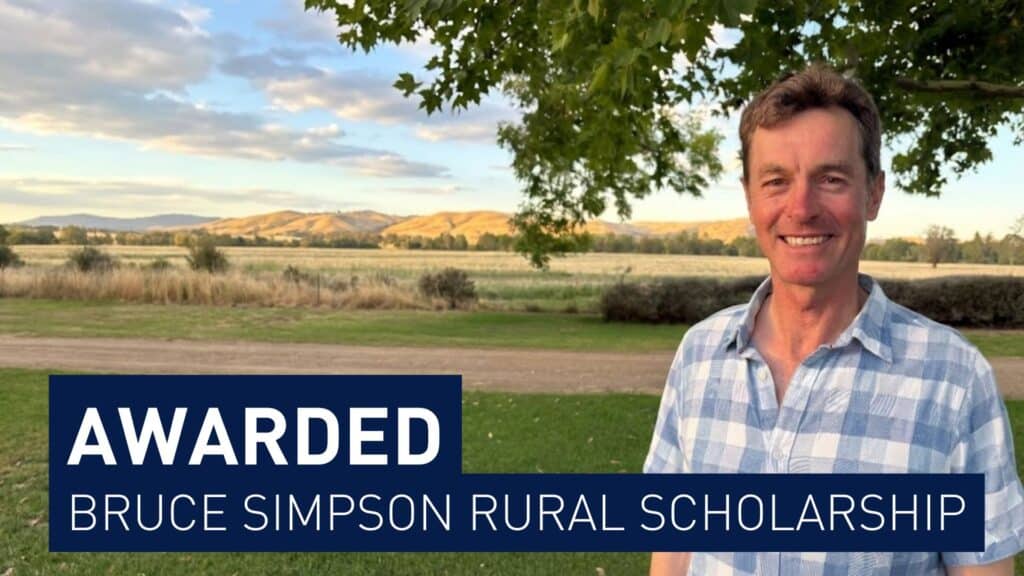Bernice Hookey has been through dark, debilitating grief and depression, and her journey to the other side of darkness has led her to a stronger connection with the importance of love and humanity in leadership.
As a leader, Bernice supports others to increase cultural inclusion and foster leadership opportunities for Indigenous people.
The proud Waanyi and Muruwarri leader sits down with podcast host, Claire Delahunty, to share her deeply personal story on the latest episode of Rural Leadership Unearthed – a podcast by the Australian Rural Leadership Foundation. Bernice shares her passion for disrupting the harmful cycles that exist around intergenerational trauma, and offers insight into her own path to healing.
Bernice took part in course 29 of the Australian Rural Leadership Program in 2022 (sponsored by the National Indigenous Australians Agency), and the experience reinforced for her the power of “everyday learning” to combat bias, prejudice, discrimination and systemic racism.
This month, we recognise National Reconciliation Week. We also acknowledge the much needed spotlight and discussion currently taking place about violence against women in Australia.

Claire Delahunty: Bernice, do you mind introducing yourself and the Country you’re on and describing a little bit about where you live and what you do?
Bernice: I am a proud Waanyi and Muruwarri woman, descendant from the Lower Gulf of Carpentaria and on the Muruwarri side on northern New South Wales. I currently live on the lands of the Wulgurukaba and neighbouring Bindal People Country.
I’m a mum to two sons and two first sons and I am also like big mum to my sister’s boys and all my siblings’ children as well. I am the founder and principal consultant of MZB Empowerment, a niche professional service with leading capabilities, integral to improve, increase and attract cultural inclusion and leadership responsibility for Indigenous people. In short, breaking down barriers and the cycle of systemic harm.
CD: Do you mind telling us a bit about what life was like for you growing up and what some of the key influences were?
BH: I am pretty humble in that, that is how I’ve been taught growing up as well as ‘always be kind and always treat others like they are your family and not judge a book by its cover’. When you’re growing up in a small community like in Mount Isa where it was a multicultural town – it wasn’t just white and black – it was people, migrants and everything around that. With my proud culture of being a Waanyi woman, I unfortunately didn’t have the language passed down to my parents for it to be fully passed down to us.
But I am still strongly connected to Country and my People. I will always still come back to that connection because that influence being around family and community led the way to who I am and why I do what I do today.
I was asked the question about influences just the other day and I actually responded with “I am my influence” because when we put focus too much on someone else (and it isn’t because that person hasn’t influenced you) but they’ve provided the guidance to influence who you are and that’s what I will keep coming back to: I am Bernice Hookey and I am proud of who I am and it’s because of those learnings I’ve been able to influence what I do today.
… I’m approaching half a century and say 20 or 30 years ago, it’d be like, “oh my goodness, that is so old” but it’s actually an age now that I encourage people to embrace because a lot of our mob don’t even get to see their 40s. They’re leaving us into the Dream Time so much younger or they are getting to the 50s and 60s and they’re being debilitated by health reasons because of reasons around trauma and hurt and everything like systemic racism and systemic harm that can cause the body to shut down without you even knowing it shuts down.
CD: As much as you’re comfortable sharing, do you mind talking about that intergenerational trauma and how it’s touched you through your journey?
BH: When I first learned about intergenerational trauma, it was through my own experiences of about seven or eight years ago now. I was extremely depressed and it wasn’t just because of what’s happened in front of me. It was a lot of things that caught up to me and I was approaching my 40s and it was a time where being a mother or having young children as well that … what do I do with them? I was attempting suicide, I was suicidal, and it wasn’t because I loved my children any less, it was the love that I didn’t give myself to be more to my family, to my children.
And the extreme grief depression was probably the hugest wake up call to who I am. Because we’re walking in two worlds, but this is my world and this is the world that we’re walking in because it’s evolving with society in a Western way. But in the cultural way, I delved deeply into listening to what I needed to do for myself in mind, body, spirit, physical, and emotional sense. And also how do I complement that with the Western way? So I went through having intensive neuro feedback sessions and they did help me immensely to be able to start to build the strength back within myself so that I could be here today. And also at the same time, I was just starting out on the journey of empowering women. Also my dad passed away. So it was like, anything else wants to crash down on me just do it now so we can just get it out and over and done with?
But the biggest thing I kept coming back to was ‘how do I not go down that road of blame, judgment, shame, why these voices keep happening in my head, in my mind?’ So when I started to allow for the tears to fall, to wash away the hurt, and honouring them and opening up in a way where I was able to feel better for myself, but feel better that I could get out of bed in the morning. I could look in the mirror at myself because it is pretty hard to do those sorts of things when you’re going through such a time… So I reached out to my mum for help, and it does take a big thing to even do that to reach out to someone to say ‘I need help’. So once I took that step, it actually felt good. I felt a weight lift off.
So that’s when I fast forward to today. All I have ever wanted to do was not ever want someone to feel that traumatic pain that I felt where I didn’t want to be here anymore. And sadly, the statistics still for suicide is still quite high. And in the prevention of it we do need our voices to be heard loudly and amplified and echoed in the winds, in the river streams, in our workplaces, that it’s everyone’s business. It’s not just an isolating business anymore, but it’s to help someone be better. There’s a better way.
CD: Just to go back a tiny bit more into who you were before that moment, it sounds like those puzzle pieces had not been put together for you in the lead up to that sort of crisis. What were you doing and focused on before that part of your life?
BH: My career started in government. I completed a traineeship and I went on to being employed by government full time and then I left by the time I was about 20. That was from 17 to about 21. I know I did work for an Aboriginal organisation and … also honouring that the month of May is not only small business month but [in Queensland] it’s domestic and family violence month as well.
Domestic violence is also extremely rife right now. So in saying that I myself am a survivor of it, but I also say that I’m a thriver because – without going deeply into the abuse that I experienced at a young age – I was fortunate I was already working and I had my own income and I had family around me. What I actually said to myself is for me to overcome the fear of ever trusting a male or a man again was to take that huge leap to keep working. But that work took me into a male dominated environment, the mining and resources sector. And I worked in that space for close to 20 years.
That led to just before I went through the extreme grief depression in my late 30s, early 40s. It was a time where it just crashed down on me like an avalanche. I learned that a loss is only a loss when you get lost in it.
And that’s what it was. I was lost in my own loss because of what I had endured personally, but also because of losing family members, losing Elders that coming back to being influential because they walked here before us and they endured so much more than anything. But yet they still persevered forward to make sure they did everything for their family. And that is where I believe I found my calling is because of the spiritual connection to my Ancestors and the spirit within myself to keep believing that I’m going to still walk tall and I am still going to walk proud because even through the emotions and the tears that fall. It’s just me letting others know that this is who I am being authentic and true to myself. This is why I can stand up here and speak to you. Not because I’m not professional in what I do, I’m human in what I do, in my profession.
CD: What were some of the other tools that helped you get through that intense grief and that dark time in your life?
BH: I wrote in a diary when I was younger, but you don’t realise that the power in that of just writing down how you’re feeling is actually pretty powerful. Whether you keep it, whether you burn it, whether you tear it up and have a big scream afterwards.
But the power in writing down the words that no longer serve a purpose within you is what needs to be lifted out so that journal writing, I believe, is the cover word for it these days.
And that was what my psychologist said to me at the time is I needed to write down how I’m feeling, record the day. Like when we’re in business, we need to record things for a report. So it’s not so that I was being reported on. It was my own report back to myself. So I had to look at it in that sense and it’s helped greatly and it still helps greatly because every day is a healing day for myself and through the times where I have felt like I want to just lose it or be angry and I do, don’t get me wrong, I do enter through those stages but I also take a step back. And I’ve always said no matter how much crap I have been through or got stuck in, it is just my fertilizer that I will turn into something to grow. I’ve leaned into the idea “we grow through what we go through”.
CD: How did you design your business?
BH: The name is from myself, ‘Ms. Bernice’. So ‘MZB Empowerment’ – Ms. Bernice empowers others. I’ve always wanted to be a consultant, but also leaning into being a practitioner. Because I’m healing, but I’m also healing others along the way in that ripple effect. If I can empower them through my story in how I have been able to, and it’s certainly not an overnight quick fix, but it’s the investment in you to take that step.
So, MZB Empowerment came to the forefront of that, where I was feeling like a disruptor, but a good disruptor. Because, we get so conditioned about rules and policies. We know they’re there to ensure that there are internal policies to your business in place. But who looks at the internal policies of the people themselves and in particular Aboriginal and Indigenous people? Because the journey that I’ve been on is about that leadership responsibility.
I hold space for myself where I know what I need to be mindful of in how I carry myself because I’m not just carrying the words that I spill out of my mouth for myself. It’s for my children. It’s for the future generations. It’s for my community. It’s for how we cannot just about letting go, but in that moment of control to let go. Go – have you healed yourself enough to love yourself enough so that when you are productively out there doing what you do, you’re doing it because it comes from within, not because it’s a face value of what you’re doing.
CD: When we talk about and read about leadership often, love is not a word that comes up a lot. And you are a massive advocate that it should and in your leadership, it does.
BH: Yes, in my experience as a survivor of domestic violence, when I projected that love would hurt me, that’s all I projected: love is hurt. So we can go out there and be this grumpy, angry black woman and do what she has to do. But it was like, I don’t want to be that and I’m not going to be that. So leadership and love is just bringing it back to the humanity of it. That’s really what that is about. It’s taking a step within where I am a leader because I can lead with love, I can lead with confidence and I can lead with respect and I can communicate to you knowing that the power within is a powerful shift for amplifying those that don’t have a voice, those that are still finding their voice and those that just need that little nudge to push the volume in their voice up that little bit louder.

CD: You did course 29 of the Australian Rural Leadership Program. What was that like for you?
BH: At the time of applying, even just filling out the application, I didn’t see it to be fit for me, to be honest with you. I was actually encouraged and nudged by a former colleague I used to work with in the mining industry. She was pretty persistent with me. And I thank her wholeheartedly for being persistent, because I would never been able to experience what I experienced on that journey. Even the experience of submitting the application, then being shortlisted, and then attending to an interview. It showed me that the people interviewing me, they’re just people like me. So I gave it my all. And I kind of forgot about it, to be honest, after I did that. Like I, it was sort of like a piece of me to lift off my, to lift off that, yeah, I’ve achieved something because, it was a huge accomplishment just to be shortlisted, being a highly competitive program to participate in the flagship program… It was pretty special to be accepted and participate because it came at a time where I was helping my family member through stuff in the child protective space. And again, it was around what do I do with this? I got the green light. I’m in the program and then having the intensity of it over the 18 month period.
It was certainly life changing where at the time of going through the crap I was going through I had knowledge and tools that helped me along the way.
So the 18 month journey, when we met with the complete strangers … And we walked away as family, like it was truly a blessing to be part of cohort 29 for we leaned into each other. We learned from each other. And it wasn’t just about each other being leaders in their respective fields or industries or workplaces. It was a community in the end. We were cohort 29 as a community and it was safe. We felt safe amongst that. It opened up our eyes from so many different angles because especially the experience in the East Kimberley where our first session of connection happened so it truly brought out the processes in connection and the importance of supporting each other and being there for each other. Because I didn’t see myself as a leader to be honest, because it was just something that I did being an older sibling as well.
CD: It seems like so many people who come through a program like the ARLP are really reassured that there is no textbook leader.
BH: The biggest blessing as a recognised leader is that recognition from elders that are blessing my journey – as in this leadership role where I am in community or in a women’s empowerment program is truly a blessing on so many levels.
CD: It sounds like you’re really consciously embodying your role; growing more senior in your spheres of influence, is that right?
BH: Yes, because even my sister actually said, you realise you’re like an elder. And I said, Oh, okay…
CD: How does that land?
BH: I’m still grasping at that one in only because, being respectful of my mum and aunties that are here, but it’s more on that leadership and eldership of that I lean into these circles that I’m part of to be the voice that I can amplify loud and proud on because of them. And the NAIDOC theme that was back a few years ago because of her, I can. So that is because of each one of them, I can.
CD: What were some of those tools and skills from the ARLP that have stayed with you?
BH: Going back to not feeling like it’s a personal attack on you when you’re out there in this big wide world or the Western way of working, that – if old mate here or her over there is saying something to you, it’s what can you do to learn from that. Within the program, I did encounter systemic racism and I brought that to the attention of the best person to speak to. I did have a conversation with the person that took place with and it was hard, but it was certainly not a thing of threat or defence. It was to do with finding solutions to the problem. Because Aboriginal and Torres Strait Islander people face heavy racism. Every day. It’s no stranger to anyone.
But yet, it’s the control of it and the acceptance of it in terms of ‘oh, he’s only joking’, but no. No more. I was at a recent forum to do with the convention on the elimination of all forms of discrimination against women. And listening and learning from these women that are providing a service on a global stand, it gives hope for us here on the ground, not just from a grassroots, but also from the roots of our labour, the roots of where we live, work, learn and play, because it is really important about the biases and the discrimination and the racism, so that it allows for open communication around honouring that conversation.
My message is: be open to everyday learning even if you are feeling that you’ve already learnt about it – keep digging deeper to deeper listening and learning, because as we know it’s not just a nation, there’s many nations that live here in Australia – over 400 – and their practices and protocols are not always the same, but it’s what has been best practice for their nation. And being respectful when we are visiting those states and territories and communities and the attitude and behaviour we can have towards someone is important, because you just never know what someone is going through.
CD: And that compassion piece is so important there.
BH: Compassion, yeah. You just want to put the human touch on it. That’s really the most important thing. This evolving society seems to be going so fast and yet we’re still here talking about; ’why haven’t we made things better for domestic violence? Why haven’t we made things better for closing the gap or reconciliation or health equity strategies? Or even generational equity?’
Being a mum of sons, one of the hardest things is that when we don’t have that support from male mentors out there – not just because there’s no support, but male mentors in your family may have passed away or they’re just not the right fit to be a male mentor.
Being a strong advocate as a sole parent to sons, it is so important that when we are raising the bar on talking about domestic violence, that men are included in that conversation. It’s just coming back to when you’re having a conversation about what’s best for an Aboriginal or Indigenous person, have them at the table with you.
Leadership starts in the home but leadership can also start because you’ve been tapped on the shoulder. The same applies for anyone out there to break down the barriers and to be the cycle breaker and walk in solidarity in this society in Australia.
CD: What do you want your legacy to be?
BH: I want my legacy to be generational equity, not generational trauma, because we have no excuse today. I listened to a, she’s an international speaker and she spoke about: ‘I am my rescue’, so you have to rescue you’.
And that’s what I did. I rescued me to rescue others.
The most important legacy I want to leave is that our young Aboriginal and Torres Strait Islander children are also part of this future. So don’t leave them behind. They’re not going to know the way where they are behind the prison cell.
Be the mentor for them. Ease the cultural load and burden of responsibility.
If any of this content has raised something for you, please seek support through the services listed below:
Lifeline: call 13 11 14 | text 0477 13 11 14 | https://www.lifeline.org.au/
1800 Respect: call 1800 737 732 | text 0458 737 732 | https://www.1800respect.org.au/
13 Yarn: call 13 92 76 | https://www.13yarn.org.au/

To catch the full interview, head to the Rural Leadership Unearthed podcast website.
Bernice’s story is one chapter of a larger narrative of ARLF change-makers and visionaries who are helping to reshape our rural, regional and remote communities.
To find out more information about the Australian Rural Leadership Program or register your interest for future programs, visit our website.
To find out more about the impact Bernice is having through her empowerment work and as an Indigenous leader, connect with her on LinkedIn.





